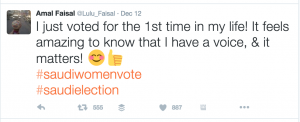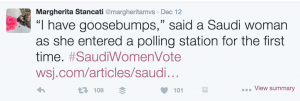For the first time Saudi women have the right to vote in their country’s elections.
The recent elections were historic not only for the suffrage of the women voters, but because women were also running for positions in the government. 978 women registered as candidates for the first time in Saudi history, along with 5,938 men. The election of 20 women represents only about 1% of the 2,100 municipal seats that were open, but their success is a bright spot in what is otherwise a bleak and deadly region for women.
The first woman to register to vote was Salma al-Rashed and she told the BBC it felt really good. “Change is a big word but the election is the way to make sure we are really represented.”
Their franchise only involves municipal elections, but it’s a milestone. Estimates were that 130,000 females registered to vote. Male registration stood at 1.35 million.Ironically, all of these voters had to be driven to polling stations—women are still banned from driving—and polling stations were segregated.
This liberalization was instituted by the late King Abdullah who also appointed 30 women to the country’s Shura Council, its top advisory board.
It is a thrilling development in a deeply conservative culture that regards women as second-class citizens. Twitter was alight – under hashtag #saudiwomenvote — with comments from women there who felt liberated finally.
“Change is a process – it started with my grandmother’s generation, and it will continue with the next,” Rozana al-Banawi told the Wall Street Journal. “What matters to me is that I’m part of it now.”
The Saudi vote is encouraging, but it’s critical that governments support an end to all discrimination against females there and elsewhere.





